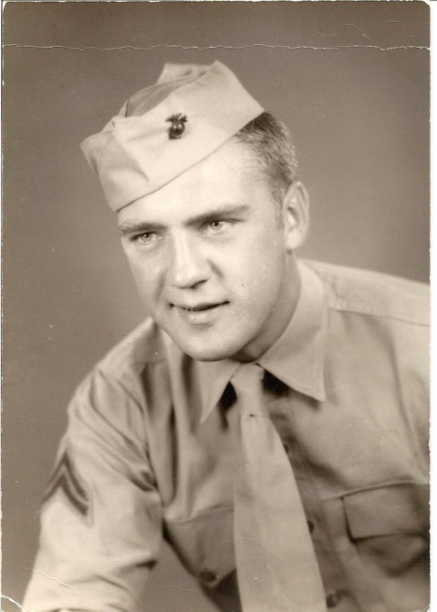Henry and Willie Grimm moved to 409 E Howell in 1931, which they purchased in June 1933. They had four sons and two daughters, a noisy, happy group of kids, attending Mt Vernon Elementary and GW High School, spending Saturdays at the recreation center on Monroe and the dime movies at the Palm Theater. Henry was a motorcycle police officer, working his way up to sergeant and then lieutenant.
In 1943 the two eldest brothers, Henry Jr and Herbert, enlisted in the Marines. They trained together and were allowed to serve together as a machine gun team in the Pioneer Regiment of the 4th Marine Division in the Pacific. They survived the battle for Saipan, although Herbert was wounded, and on 19 February 1945 they landed on the soft volcanic ash of Iwo Jima. The beachhead turned into a bloody cauldron and corporal Herbert Grimm was killed that very first day.

In 2003 the City interviewed Shirley, the youngest daughter, now Shirley Warthen, on her recollections. Here is an except.
Shirley Warthen: I know my mother and father were worried. And then of course, both of my brothers went off to war and only one came back. I’ll never ... I won’t forget that. And, of course, in those .... They both left within months of each other. And they stayed together in the service. That was before the Sullivan Act and they stayed together. They did their training and they went overseas together. Of course, they came home a couple times before they went. And, then they were ... they landed on Iwo Jima and my brother was killed. One brother was killed. It was hard on us but my brother that was with him, it was very, very hard.
M.B.: I imagine.
Shirley Warthen: Yes. It is something he lived with all of his life.
Interviewer2: The one who died was older?
Shirley Warthen: Younger. He was nineteen. The older one was, would have been almost, close to twenty-one. Herbert was killed the day of the landing. That was in the nineteenth of February in 1945. In those days, we didn’t know it until March, late March. My mother – we didn’t know it as children – but my mother had a sense that something was very wrong because a letter was returned. One letter was returned. There were certain things that you learned in those days that meant ....
MB: Right, signs.
Shirley Warthen: And one letter had been returned. I was not home. A friend of my mother’s, where my mother went to the beauty shop, I used to go there after school. It was across from Mt. Vernon Grade School. It might have been that ... well, it’s called Potomac in here, but that’s not what it was when I went there. And I would go over and pick up hairpins and take hairpins out of people’s hair and do things like that. Little odd jobs and she would pay me some change. I hadn’t gone home, but I met my .... I started home and my uncle, about a block from my house, asked me had I been home. And I said, “No.” He said, “You must go, right now. You must go home.” And, when I arrived home, my sister greeted me and told me that my brother had been killed. But I know that the message was delivered by a car with a chaplain to my mother. A chaplain and a marine – they were in the marines – come [sic] to the door. She was sitting across the street at a neighbor’s house and she said, “I know something is very wrong.” And she went over and they called my dad home. But I remember when the telegram came, which was two weeks later. I have the telegram that informs you that your son’s been killed.
What I remember, too, is Vivian Riley, and I don’t remember the other kid’s name, because you figure it was spring. There was about four or five little kids that had cut apple blossoms off of a tree and knocked at the door and said, “Here, we’re sorry ....” And for little kids ....
M.B.: Young – how old would you say?
Shirley Warthen: I must have been nine, ten, and they were eight, nine, ten.
Interviewer2: Were they friends of yours?
Shirley Warthen: Yes. They were just on the street, that lived on the street, that we played. And I can still see them coming to that door.
M.B.: Vividly.
Shirley Warthen: Yes, with these little apple blossoms.
M.B.: Because it was spring.
Shirley Warthen: Yes. But Henry came home. Got married. Had his family. But it was a hard life. It’s something he lived with all his life. I don’t think he ever .... I think, one thing, it’s always “Why me?” The two of you side by side, you know, why him, not me.
Interviewer2: He witnessed his brother’s ... ?
Shirley Warthen: Oh, yes.
World War Two Losses
Charles Herbert Grimm